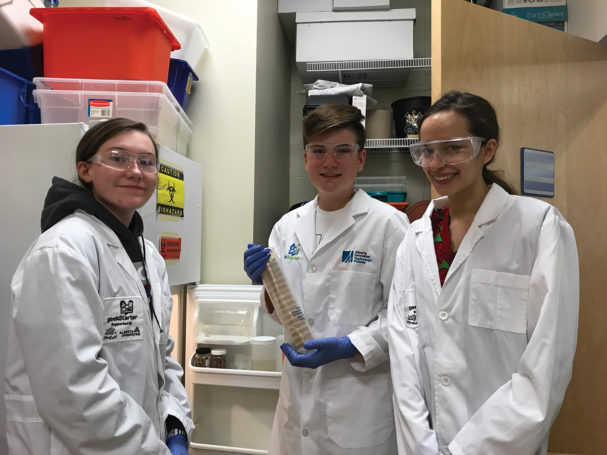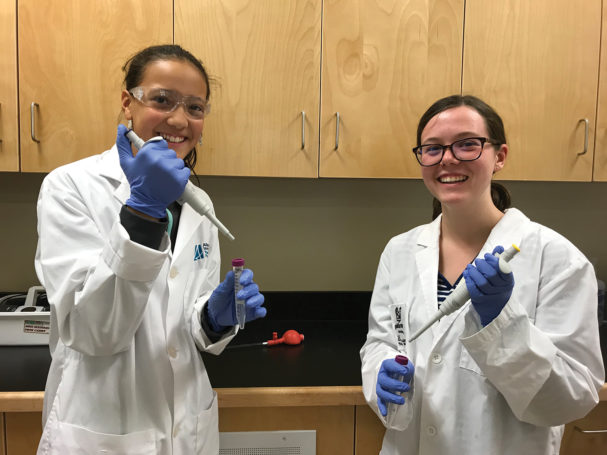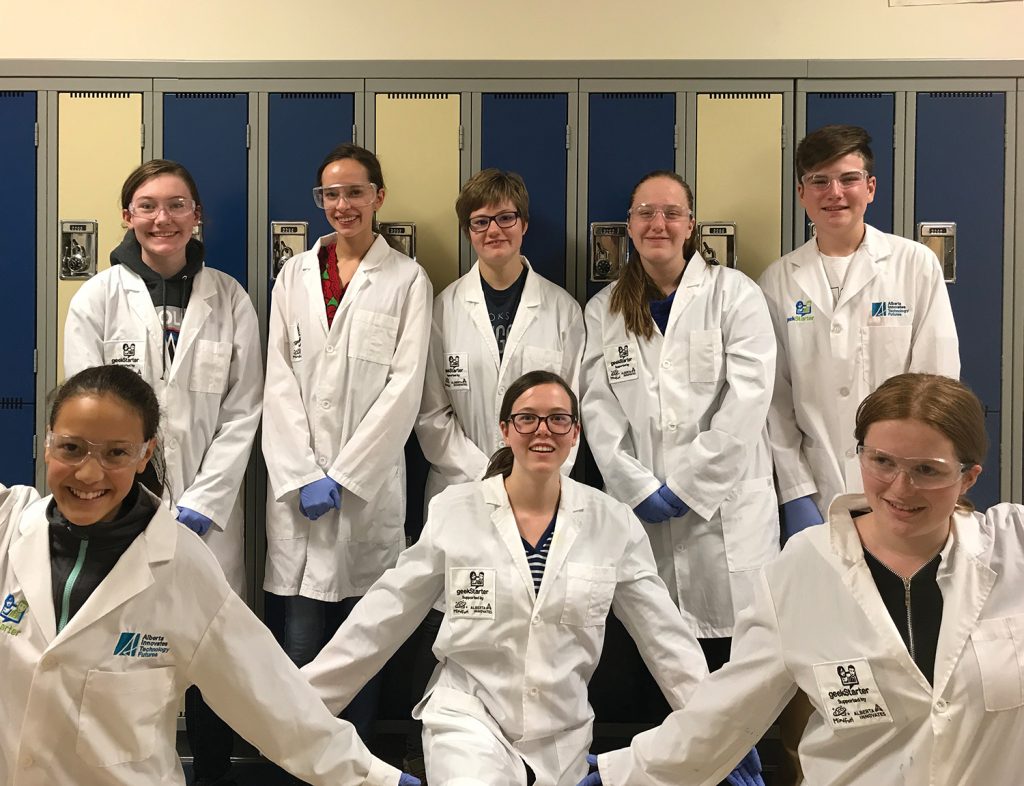An ECF-supported student club grapples with real-world issues
Every Thursday, a group of curious students between Grades 7 and 12 gathers in a science lab at Our Lady of the Snows Catholic Academy in Canmore. Under the guidance of science teachers Jessica Puurunen and Ryan Washburn, they learn the fundamentals of synthetic biology and begin applying them to actual problems.
“We’re trying to get them to learn by doing,” says Puurunen. While conventional science classes give kids the chance to do laboratory exercises, they tend to be demonstrations of concepts rather than actual experiments, she explains. In SynBio Club — supported in part by an endowment fund created by a family through Edmonton Community Foundation (ECF) — the students pick a problem to tackle (last year, it was plastic waste in oceans) and work together to apply their knowledge to developing possible solutions.
The main tool in the students’ toolbox is synthetic biology, a relatively new field that alters components within cells to create new biological systems. Examples include bacteria that digest oil for the purpose of environmental remediation, rice cells that create Vitamin A to address vitamin deficiencies in impoverished communities, and yeast cells that act as miniature production facilities for an antimalarial drug. “It’s really looking at biology as a technology — living cells as a technology,” says Puurunen.

It sounds complex because it is. Even so, she notes, the many students who participated in the club since its inception five years ago managed to get a handle on it. “I find that with a little support and mentorship, kids can really figure it out. They really can wrap their minds around some complex things and learn to apply it,” she says.
Last year’s group brought their project to Boston for the International Genetically Engineered Machine (iGEM) competition, which originated at the Massachusetts Institute of Technology (MIT), where international student teams compete every year. The group set out to create bacteria that bind to PET plastic (the kind used in water bottles) to make it easier for recycling facilities to differentiate it from other forms of waste.
In the end, despite the students’ best efforts, the technology they developed didn’t work consistently. Even so, the team brought home the Chairman’s Award for academic integrity for a side project that created specialized scientific tools to make lab work more accessible to students with disabilities.
This year’s project may turn out to be just as ambitious. The team is interested in prosthetics — specifically, the idea of living systems interacting with robotics (as is the case with cochlear implants, for instance). Puurunen explains that students are at the beginning of their investigation and have yet to determine the precise problem they aim to solve. “What can happen is that once you get into it, you often pivot your idea — sometimes multiple times,” she says.
The students are eager to dig in. One of the youngest team members, Nami — a Grade 8 student — has been excited to get involved since reading about the club in a local newspaper last year. “Synthetic biology just seems like magic to me,” she says. “You can make slight changes to the DNA of a cell and it can do so many things.”
Her teammate Anya is a Grade 11 student who joined the club two years ago, following in the footsteps of her older sister. She plans to have a career in biology and SynBio Club offers her an opportunity to deepen her understanding.
“When you’re in a classroom, a lot of the things you learn can seem very distant and complex, and not always relevant. You’ll learn pipetting or something, and how to use it, but not why you’re learning it,” she says. “Whereas with this, you really have the opportunity to pave your own path and do the things you want to do because you know you want to do them.”
It’s too soon to know if this year’s cohort will compete at iGEM in Boston, but Puurunen points out that students will attend different learning opportunities at Alberta universities throughout the year. The group also travels to Edmonton, Calgary and Lethbridge for mentorship from university scientists. None of this would be possible without the funding SynBio receives from ECF. “It’s huge for us because, as you can imagine, we don’t have a huge budget and we’re talking about specialized microbiology equipment that isn’t standard fare for a science department,” she says. Travel costs for the rural club can also be expensive.

Puurunen notes that funding challenges partially explain why clubs like hers are rare in Alberta, which is a shame as the experiences they offer can be invaluable. On top of enhancing their scientific knowledge and understanding of global issues, SynBio Club helps students consider their paths after high school. “Our goal is to expose them to as many new technologies and options as possible so they know what’s out there and what they could do,” she says.
“When you’re in a classroom, a lot of the things you learn can seem very distant and complex, and not always relevant. You’ll learn pipetting or something, and how to use it, but not why you’re learning it,” she says. “Whereas with this, you really have the opportunity to pave your own path and do the things you want to do because you know you want to do them.”
It’s too soon to know if this year’s cohort will compete at iGEM in Boston, but Puurunen points out that students will attend different learning opportunities at Alberta universities throughout the year. The group also travels to Edmonton, Calgary and Lethbridge for mentorship from university scientists. None of this would be possible without the funding SynBio receives from ECF. “It’s huge for us because, as you can imagine, we don’t have a huge budget and we’re talking about specialized microbiology equipment that isn’t standard fare for a science department,” she says.
Travel costs for the rural club can also be expensive. Puurunen notes that funding challenges partially explain why clubs like hers are rare in Alberta, which is a shame as the experiences they offer can be invaluable. On top of enhancing their scientific knowledge and understanding of global issues, SynBio Club helps students consider their paths after high school. “Our goal is to expose them to as many new technologies and options as possible so they know what’s out there and what they could do,” she says.
